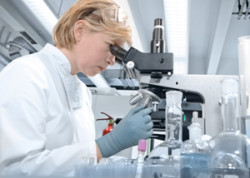
New test for birth defects could show which drugs cause birth defects before they hit the market.
Scientists use chemical assays (analysis) to test various chemicals and drugs for all sorts of properties. These tests can allow scientists to quickly screen large numbers of chemicals quickly. For example, a chemical assay may tell researchers if a compound can treat—or cause—cancer or other diseases. As a recent development, a company called Stemina Biomarker Discovery was recently awarded a $10.6 million grant to develop an assay that can screen drugs and other chemicals for their potential to cause birth defects.
The U.S. Environmental Protection Agency or EPA has issued a contract to Stemina to develop a reliable assay for teratogenic properties, or the tendency to cause birth defects. At present, scientists often rely on animal trials or even epidemiological evidence to deduce such properties. The birth defect test by Stemina seeks to use living cells and preserved proteins to test for these properties.
Tests for birth defects can be very important. Knowing which drugs cause birth defects can help women try and avoid damage while treating depression during pregnancy. Currently, there is litigation against the manufacturers of Zoloft, Paxil, Prozac and other selective serotonin reuptake inhibitor (SSRI) antidepressants over concerns that the drugs may cause birth defects. Lawsuits have alleged that SSRIs can cause a host of birth defects, particularly heart malformations and cranial defects.
The evidence for these birth defect lawsuits have largely hinged on epidemiological evidence, or evidence collected from large numbers of people who used the drug. These tests seek to compare the risk of developing birth defects between mothers who took antidepressants while pregnant and mothers who did not. While several such studies have found an increased risk, epidemiological studies are not always the most conclusive scientific analysis. However, animal trials have also found the same results. Both of these types of studies have been entered as evidence in the ligation against the manufacturers of SSRI drugs.
A birth defect test like the one Stemina is being funded to produce could provide valuable insights on the causes of birth defects. While it could provide evidence in SSRI birth defect lawsuits, it could also help protect unborn children by improving our understanding of the causes of serious birth defects. Stemina’s previous work centers around testing the safety of chemicals and working to develop a blood test for autism.
Legal Help for SSRI Birth Defect Victims
If you or a loved one has had a child who suffered from birth defects after taking Zoloft, Paxil, Prozac, Effexor or another antidepressant, you’ve almost certainly been through a trying ordeal. Having a child with birth defects requires parents to emotionally shift gears from excitement at a new child’s birth to coping with a medical crisis. This type of situation is not only an emotional challenge, but a financial trial as well, with medical costs, lost wages and lost income potential. When facing such a challenge, many parents feel overwhelmed, or even depressed.
It is important to remember that regardless of the challenges you face, you still have rights, and there are steps that you can take to regain a measure of control over your situation. You can start by visiting the Zoloft & SSRI Antidepressant Birth Defect Class Action Lawsuit Investigation. Here, you can enter information about your situation for a free legal review by an expert with a background in this type of litigation.
ATTORNEY ADVERTISING
Top Class Actions is a Proud Member of the American Bar Association
LEGAL INFORMATION IS NOT LEGAL ADVICE
Top Class Actions Legal Statement
©2008 – 2025 Top Class Actions® LLC
Various Trademarks held by their respective owners
This website is not intended for viewing or usage by European Union citizens.














